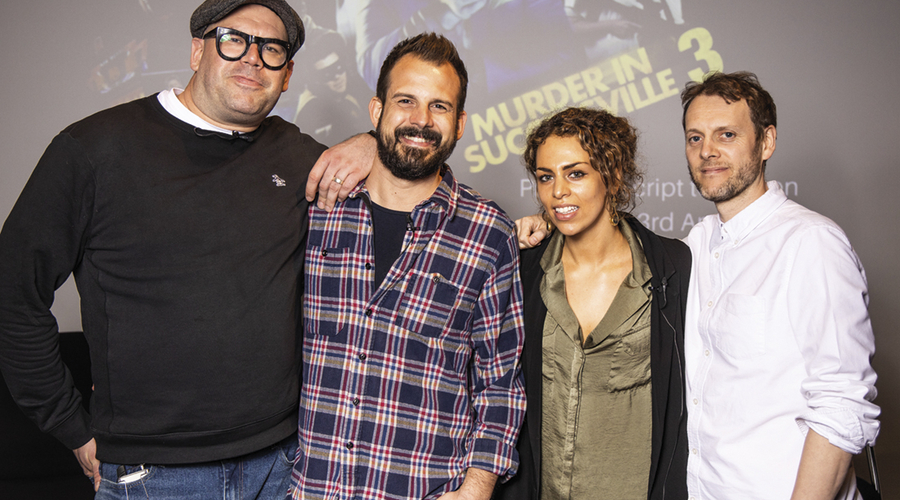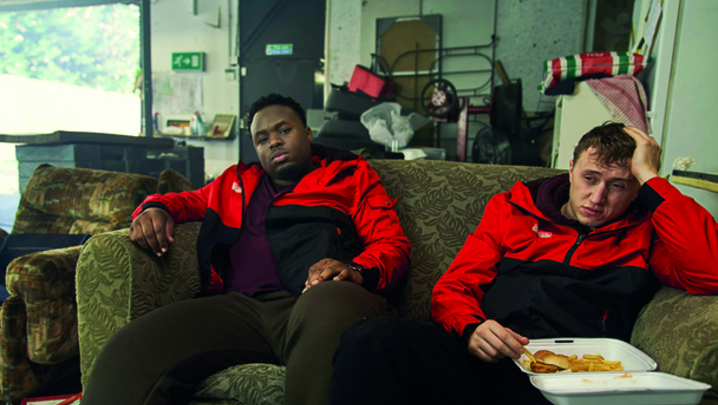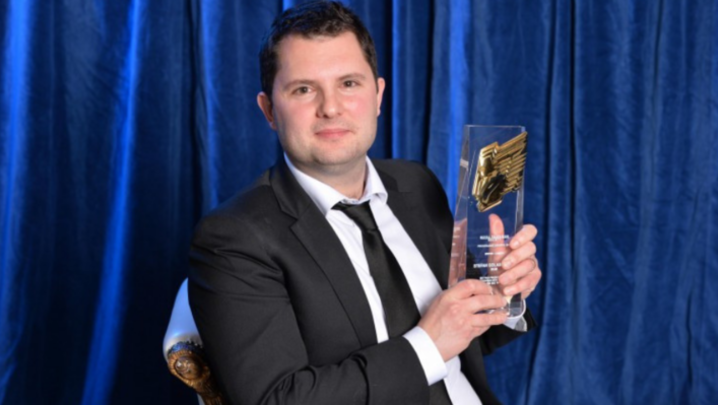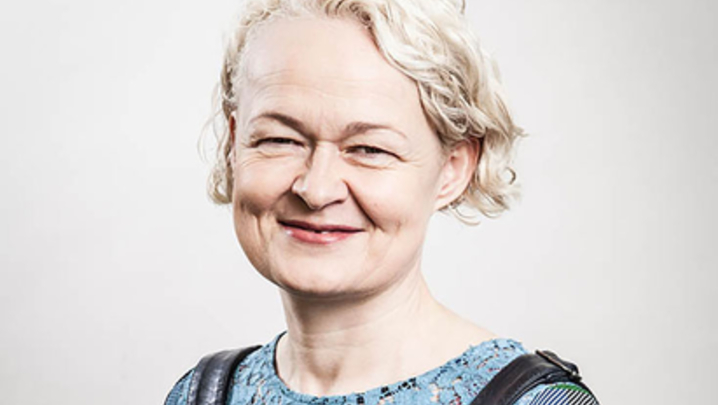If you want to write and sell a successful comedy, there are no shortcuts, reports Steve Clarke
A packed RTS Futures event, “Pitching script to screen”, offered aspiring writers and producers tips on how they should hone and sell their ideas to commissioners.
Leading the panel of seasoned comedy and entertainment practitioners was Tom Davis, the star of the RTS and Bafta award-winning BBC Three sitcom Murder in Successville.
Throughout the session, he stressed there was no substitute for hard work. Even experienced TV actors and writers such as himself never stop learning: “If you want to learn a craft, take the time to learn a craft. Learn how to write. I am still learning every day. All of us sitting here are still learning.”
He continued: “I’ve been in a position where I thought I knew best, and I didn’t. Listen and learn.… Be prepared to collaborate.” Writing comedy often involves partnerships, because it helps to have a sounding board.
Building up that initial contact with important commissioners was essential, agreed the panellists. “We got a meeting with Shane Allen at Channel 4 [then head of comedy] and we made him laugh for an hour,” quipped director, producer and writer James De Frond, who went on to direct Murder in Successville. “He gave us £10,000 to film a couple of scenes.… We were so passionate that, in 10 days, we filmed an entire half-hour pilot.”
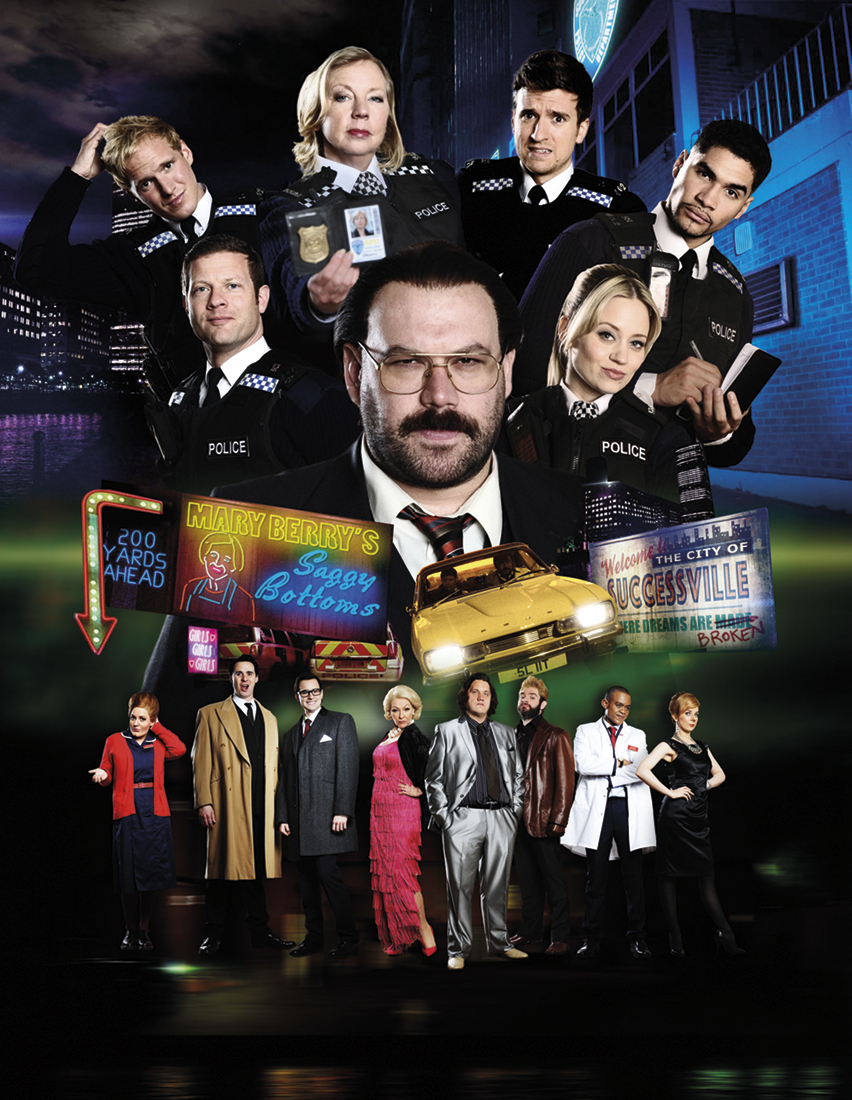
Davis interjected: “I thought we’d smashed it [but], if you’ve got to pay a load of people, 10k doesn’t go very far. But we had got our foot in the door and we left something with Shane that was going to blow him away.”
De Frond added: “We threw everything at it. At the time, Channel 4 did a season of six half-hour pilots, Comedy Showcases. We didn’t get the series, but we did then have a relationship with Shane. All these contacts pay off. It was an opportunity to get a meeting.”
De Frond and Davis, together with Andy Brereton, the session host, went on to do a lot of work together. And, two years ago, it culminated in the three of them setting up Shiny Button Productions.
De Frond outlined how, when attending pitching meetings, it paid to have more than one idea. “Always have a back-up idea,” he advised, recounting the time he went to Channel 4 to pitch a high-concept Western that was rejected. “They said: ‘We love it but we’re already doing a big, high-concept show.’ In our back pocket we had another idea – based on a true crime that took place in the 1980s, which they loved.”
Davis added that it was important to “know an idea inside-out”. It was essential to spend a lot of time interrogating an idea before the pitch.
He explained: “You’ve got to make sure that every question they throw at you, you’ve got the answer to. You’ve got to think: why would people watch this? What’s funny about it? The stronger your idea and the fewer the holes in it, the fewer questions [the commissioner] will have about it. Make sure there is nothing half-baked about it.”
De Frond pointed out that the way an idea was packaged needed careful consideration. It helped to have star names attached: “It’s got to be a package that they can’t turn down.”
Lara Singer, a development producer at comedy specialist Big Talk Productions for the past five years, agreed that the overall package was key. She said that creators needed to ask themselves questions like: do we need to get another writer on board? Is it innovative? Have the commissioners ever seen anything like this before? Commissioners routinely receive 15 to 20 scripts day, so yours has to stand out,” she said.
“It’s important to have something that is going to wow people,” said Davis. “As much as you want to be a creative, you’re a salesperson selling an idea. I’ve worked selling T-shirts and this is no different.
“There’s no point trying to sell a second-hand Cortina when someone wants to buy a brand new BMW.”
The experience of working for several different production companies helped writers and producers to acquire different approaches, he noted: “I’ve worked for Big Talk, Baby Cow and Tiger Aspect. Every company comes at it from a slightly different direction. You learn different ways of attacking it.”
"You need the first line of your treatment to pique their interest. If you’ve got them by the second page, they’ll read the rest"
Brereton, who co-created and produced Successville, advised that the opening paragraph of a treatment should sum up the idea in a single sentence, fleshed out by more detail
in subsequent sentences.
He said: “I always think that if you can sell an idea in a paragraph… commissioners have no time and have piles of scripts, so you need the first line of your treatment to pique their interest. If you’ve got them by the second page, they’ll read the rest.”
Davis chipped in: “You want to walk out of that [pitching] meeting knowing that they’re going to remember it for the rest of the day. Act it out, make ’em laugh, make it funny.”
He continued: “Attach jokes to stories. It might not be the best joke you’ve ever heard, but it has to link to the story [otherwise it’ll probably get cut]. It has to sit in the story. Everything has to be story-based.”
After the pitch, said Davis, it was vital to be clear about which idea the commissioner had bought in to: “What is the idea we’ve sold?”
With new talent, stressed Singer, it was important to rehearse the pitch thoroughly. “We run through everything beforehand to make sure they’re comfortable,” she said.
The tone and style of the treatment (preferably including pictures) all help, said Brereton. “A friend of ours did Sex Education and the treatment actually looked like Sex Education – but not so that it got in the way,” he said.
Things were changing, though. Netflix isn’t keen on treatments,” said De Frond. “It wanted to see the script. That is how it works.” The emergence of the global streamers had changed things radically. “We’ve all had to open up our minds,” acknowledged Davis.
Singer explained that “interactive treatments”, utilising social media, had started to emerge.
She described how she had sold a new relationship comedy, Just a Couple, to BBC Three. The series focuses on the lives of a modern couple, Mark and Shavon, and was developed from a YouTube short made by Sebastian Thiel, his sister and best mate (Thiel was named by the Evening Standard as one of the most influential Londoners under 25).
“It didn’t come through the usual route of an agent or a production company,” said Singer. “We get a lot of shorts sent in, but Just a Couple immediately stood out. It was warm, characterful and funny. We spent two years with Sebastian, working on how we could develop it from a short into something that exists in a bigger world.
“Sebastian is a brilliant example of someone who didn’t follow the usual paths. He didn’t go to film school. Just a Couple is totally fresh and he has a totally distinct voice. He’s amazing and doing brilliant things.

“It’s an example of how someone who was off our radar, and who made something off his own back, can cut through.”
“I didn’t write it because I wanted fame and recognition. If you want that, a quick hit of fame, go on Towie."
Davis said it was always important to spend a long time “crafting and honing” an idea. This had been the approach on Murder in Successville and King Gary, which he co-wrote with De Frond (who also directed) and which was shown by BBC One last December.
“I put my heart and soul into it,” said Davis. “I didn’t write it because I wanted fame and recognition. If you want that, a quick hit of fame, go on Towie.”
De Frond agreed. “We spend a lot of time beating out the story arc across the series before we even start thinking about episode 1,” he said. “To get the first episode right, you need to do a lot of hard work. That’s how we approach every project. Not everyone does that. The more you can put into it, the better.”
Davis recommended giving actors more material than necessary – as well as doing the hard graft. Writers needed to ensure that they got paid for writing scripts. “We’re working with two young guys who had previously written a script for a production company that didn’t pay them. Everyone in this room should take heed,” warned Davis. “That is the most disgusting way to treat new talent, because it will kill everything we’re trying to nurture.
“Nurture people properly. With these guys, we’re not even ready to write a script. Let them have the time to develop their story. It’s a very delicate subject matter, so we need to make sure we get this right.”
De Frond said that he had learnt a lot from working in American writing teams – far more that he did from reading a lot of books devoted to screenwriting. “There, I learnt the basis of writing a sitcom episode – the basic three acts, the set up, the pay-off.”
Simplicity was the key. “When you sit down and watch a show, you don’t want to watch something overly complicated,” suggested Davis.
He told the Futures crowd that it was always better to leave a TV audience wanting more than to let a series run and run until it went off the boil. Murder in Successville had gone out on a high – following three successful series.
“There comes a time when you have to ask yourself: why are you making this? You’ve got to keep on challenging yourself. Every day, we come in to work and try constantly to push ourselves as creatives, as professionals and as people.”
The RTS Futures Event ‘Pitching script to screen’ was held at the London Transport Museum in Covent Garden on 3 April. The producers were Andy Brereton and Melissa Clay-Peters, head of creative talent at EndemolShine UK
Aim high when you’re pitching
Tom Davis Shiny Button: ‘Make sure that your treatment wows the person reading it. Black text on white paper isn’t going to do that. Make sure you’re really selling your idea (for instance, with images).’
Tom Davis Shiny Button: ‘When you’re writing a script, move it on. You read some scripts and they don’t go anywhere.… Make sure that there’s a journey. Keep things moving.… You’d be surprised at how many things we read and, by page 3, I’m bored.’
Lara Singer Big Talk: ‘Remember that movement makes people care.’
James De Frond Shiny Button: ‘If it’s comedy, everything should be funny, including the stage directions.’
It really is the story, stupid
Tom Davis Shiny Button: ‘Everyone in this room has a story. It’s important to let people tell their stories.
‘When we started pitching, there were only a handful of channels doing comedy. Today’s landscape is different and that’s encouraging for everyone here.
‘Make it the truth of what you want to write about. We’re working with a couple of young writers and, when they start telling us about their lives, it’s incredible. We’ve told them: “That’s the thing you should stick to.”’
"Be open to notes. They’re not criticism, they’re ideas"
Lara Singer Big Talk: ‘Fringe theatre is a great place to start sharing your stories and getting people to see them.’
The panellists agreed that writers must be open-minded about feedback to their scripts. Shiny Button’s James De Frond insisted: ‘Be open to notes. They’re not criticism, they’re ideas.’

